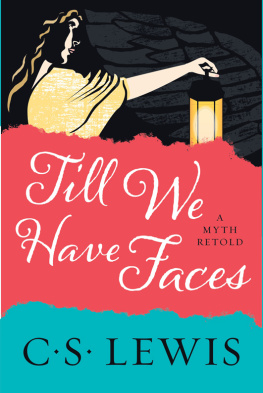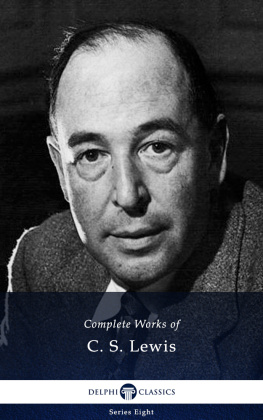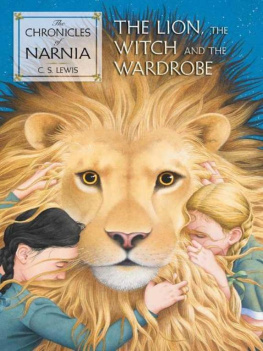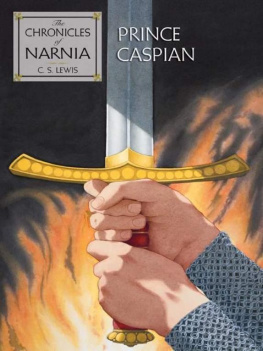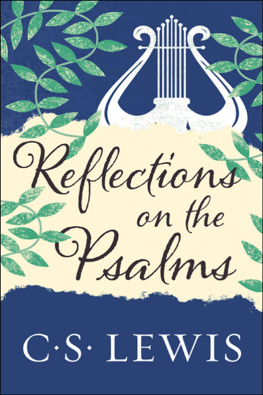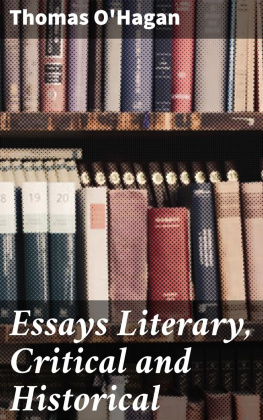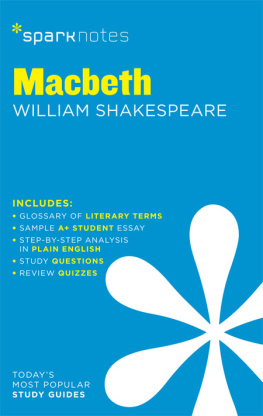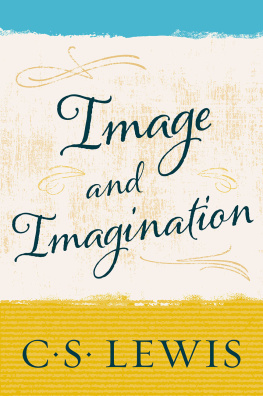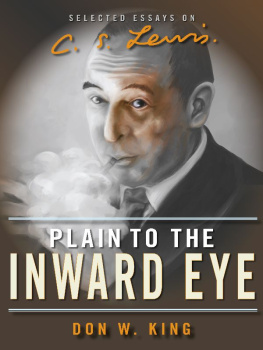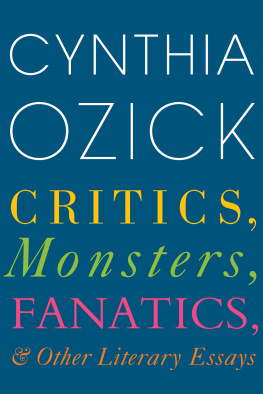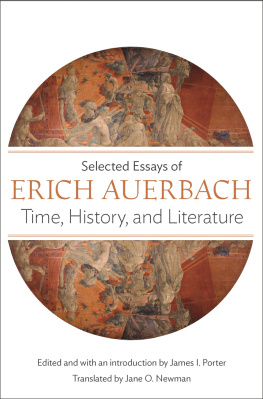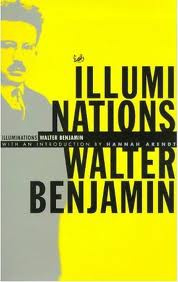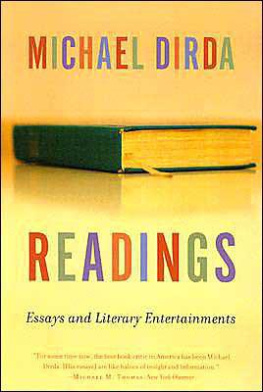CONTENTS
This book contains all C. S. Lewiss essays on literature, with the exception of his Studies in Medieval and Renaissance Literature and four other essays which I am unable to reprint here. All have been published before either in periodicals or collections of essays by various hands. As a good many are out of print, however, and the cost of owning the volumes in which the others are contained would be prohibitive, it has seemed to me a good time to gather them into one volume. Before mentioning each in turn, I hope to throw some light on the background out of which these essays arose.
From his schooldays Lewiss major ambition was to be a great poet, and what appeared to be his first step in that direction came early in his life. In 1919, a few months after his return from the war to read Honour Moderations at University College, Oxford, he published his first book, Spirits in Bondage: A Cycle of Lyrics , under the pseudonym of Clive Hamiltonforty poems, most of which were written during his years at Malvern College (191314) and while he studied privately under W. T. Kirkpatrick at Great Bookham in Surrey (191417). Though Lewiss academic record at Oxford is most impressivea First in Mods (1920), a First in Greats (1922), and a First in English (1923)the diary he kept from 1919 to 1929 is anything but optimistic. It is, in the main, a chronicle of his efforts to write and publish his poems. Although his chief interest lay in the long narrative poems he was writing at the time, he sought to keep the name of Clive Hamilton before the public by posting one short poem after the other to the editor of such-and-such a magazine. With one exception, If we did not have Lewiss forty-odd books of literary criticism, literary history, theology, novelsas well as the volume or essays in your hands at the momenthis diary would tell a very unhappy story indeed.
While Lewis was tryingand failingto join the ranks of his favourite poets, he was at the same time anxious to defend them against the vogue for vers libre and the modern contempt for narrative poetry. Opportunities lay close at hand.
One was the Martlet Society, a literary society in University College limited to twelve undergraduate and former graduate members. The minute-books of the society are lodged in the Bodleian Library. And though the quality of the writing of the minutes varies over the years, there emerges from the pages a most lively account of Lewiss participation in the fortnightly meetings.
Lewis was elected Secretary of the Martlets at their 188th meeting on 31 January 1919. At the 191st meeting on 12 March 1919 (while Lewis was acting as scribe), a fellow-member read Lewiss paper on William Morris. It was by no means as thoughtful and developed a paper as that printed in this book, but some of the same ideas appear in both. At the 196th meeting on 15 October 1919 Lewis was elected President of the Martlets, and on 3 November 1920 Lewis (still President) read a paper at the 211th meeting, the basic ideas of which continued to be those he held for the rest of his life. The Secretary records that:
There being no further private business, the President commenced his paper on narrative poetry. He took up, from the first, a fighting attitude. In an age of lyrical activity he was come to defend the epic against the prejudice of contemporaries. Edgar Allan Poe had said that a long poem was impossible, but he was sufficiently answered by the extreme richness of our literature in good narrative poetry. The real objection of the moderns was based on the fact that they would not make the effort to read a long poem. That effort, the reader contended, was necessary to the true appreciation of the epic: for art demands co-operation between the artist and his audience. He went on to speak of the poetic fullness of narrative poetry, illustrating the power for tragedy by a quotation from the Tenth Book of Paradise Lost, and mentioning Masefields Jane in Reynard the Fox as an example of the portrayal of character. Quotations from Spenser showed to what advantage a great artist could use external surroundings as a background to develop a mood. After an interesting digression on the nature and value of simile, the President brought his paper to a close. It was as able a vindication of the narrative form as could well be constructed; and it was strengthened by a varied, though certainly not excessive, use of quotation.
After his examination in Greats, financial and domestic worries set Lewis hunting for a job. As he was unable to obtain a fellowship in any of the Oxford colleges to which he applied, his father offered to support him for another year. Lewis had already come to the conclusion that it is impossible to be a poet
His disappointment was not long-lasting. He was fortunate in having Professor F. P. Wilson for his tutor and on that same day he began an essay on Chaucers debt to the Filostrato the germ, no doubt, of the third essay in this book. The entry in his diary for the next day will, perhaps, come as a surprise to those of us who have long admired the beauty and clarity of Lewiss prose. From lunch till tea time, he wrote, I worked at an essay on Troilus. My prose style is really abominable, and between poetry and work [i.e. domestic chores] I suppose I shall never learn to improve it. His interest in the Martlets, which had flagged during his reading for Greats, was rekindled and he became a more regular and serious member.
Though Lewis continued to devote some time every day to his own poems, his interest in English literature flourished and broadened under the guidance of F. P. Wilson and his tutor in Anglo-Saxon, Miss Elizabeth Wardale. It is interesting to discover from his diary how many of the essays in this book had their origin in the weekly essays Lewis wrote for Professor Wilson. Besides the one on Chaucer, I find, for instance, him writing on 18 January 1923: I went on with Donne and read the Second Anniversary which is a new planet: I never imagined or hoped for anything like it. A few days earlier he had begun his paper on Spenser for Professor George Gordons discussion class.
It was at this class, held in an upstairs room in the Schools overlooking High Street, that Lewis on 2 February 1923 first remembered seeing Mr (now Professor) Nevill Coghill whose turn it was to read a paper on Realism. Lewis was immensely impressed by the man and his paper, and was delighted when they met a few days later at a tea given by Miss Wardale. Coghill, he wrote that evening, did most of the talking, except when contradicted by me. He said that Mozart had remained a boy of six all his life. I said nothing cd. be more delightful: he replied (and quite right) that he could imagine many things more delightful.
It had been decided at the outset that the minutes of Professor Gordons class were to be kept in Chaucerian verse, an inducement in itself to Lewis and Coghill. Though Professor Coghill has told us of the paper on Spenser which Lewis read to the class on 9 February 1923, I am able to offer the following extracts of the minutes which Professor Coghill wrote at the time. Lewiss own manuscript has not survived, but Professor Coghill, writing close on the heels of the event, tells us in his notes as much as we shall probably ever know of Lewiss paper:
In Oxenford some clerks of degree
Were gadrd in a goodbye companye
And I was oon, and here will yow devise
Our felaweshipe that worthy was and wys...
Sir Lewis was ther; a good philosopher
He hadde a noble paper for to offer.
Wel couthe he speken in the Greek tongue;
And yet, his countenance was swythe yong...
Then to Sir Lewis turned the Professour
(That was our tales juge and governour)


